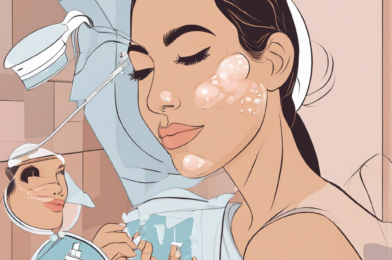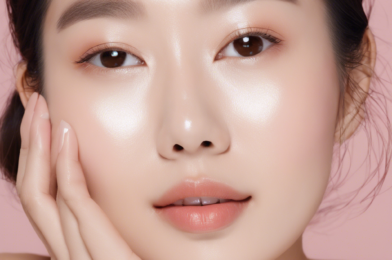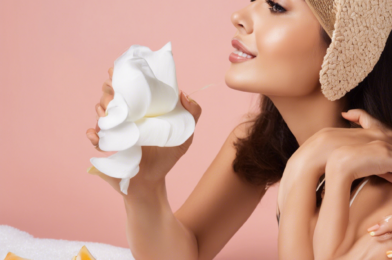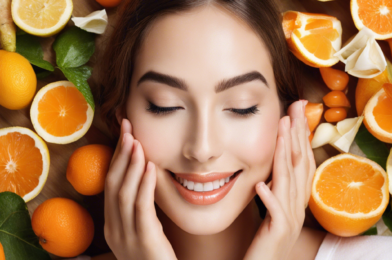As the seasons change, so should your skincare routine. The varying weather conditions can have a significant impact on your skin, and it’s essential to adjust your regimen to maintain a healthy and glowing complexion all year round. Understanding the unique challenges each season presents to your skin is the key to achieving this. So, let’s dive into the specifics of seasonal skincare and explore how you can adapt your routine for every weather.
During the chilly winter months, your skin is subjected to harsh cold, dry air, and artificial indoor heating, stripping its natural moisture. To counter this, opt for richer creams and hydrating oils to replenish and seal in moisture. Thicker balms and ointments are ideal for creating a protective barrier, shielding your skin from the elements. Don’t forget to exfoliate gently to slough away dry, flaky skin and always apply sunscreen, even on cloudy days, to protect against the sun’s damaging rays, which can still penetrate through the gloom.
In contrast, summer calls for lighter, water-based formulations. The heat and humidity can lead to excess oil production and clogged pores, so choose gel-based moisturizers and serums packed with hyaluronic acid and aloe vera to hydrate without weighing the skin down. Don’t skimp on SPF during this season, as the sun’s UV rays are at their strongest. Opt for broad-spectrum sunscreen with an SPF of at least 30 to protect against both UVA and UVB rays, and reapply frequently, especially if you’re swimming or perspiring heavily.
Spring and fall present transitional weather that calls for a more balanced approach. As you transition from the extremes of winter to the vibrancy of summer, embrace multitasking products that offer a range of benefits. Look for ingredients like niacinamide and vitamin C, which can help brighten and even out your skin tone while also providing antioxidant protection. Exfoliation is key during these seasons to remove any buildup of dead skin cells, revealing a radiant complexion. Gentle chemical exfoliants, such as those containing glycolic or lactic acid, can help refine the skin’s texture without being too harsh.
Additionally, don’t underestimate the power of dietary and lifestyle choices in achieving healthy skin. Stay well hydrated by drinking ample water, and incorporate skin-nourishing foods rich in omega-3 fatty acids, antioxidants, and vitamins. A nutritious diet, combined with a tailored skincare regimen, will ensure your skin thrives despite the changing seasons.
Now that you understand the basics of seasonal skincare, it’s time to delve into specific routines and product recommendations for each weather condition. Remember, everyone’s skin is unique, so pay attention to your skin’s reactions and adjust your routine accordingly.
In winter, focus on hydration and moisture retention. Cleanse with a gentle, creamy formula, and follow up with a hydrating toner to prepare your skin for the richer creams and oils to come. At night, treat yourself to a nourishing face oil, massaging it into your skin with gentle upward strokes to promote absorption and circulation. Don’t forget to pay extra attention to your eyes and lips, which tend to get drier in this weather, by using a rich eye cream and a hydrating lip balm.
For summer, simplicity is key. Start with a gentle gel cleanser, followed by a lightweight hyaluronic acid serum to attract and retain moisture. Then, apply a water-based or gel moisturizer to seal the deal. Exfoliate once or twice a week to keep pores clear, and always remember to lock in your routine with a suitable sunscreen. If you plan to spend extended periods outdoors, consider investing in a sun hat and UV-protective clothing for added protection.
During spring and fall, you have more room to play with active ingredients. Introduce a vitamin C serum to brighten and protect your skin, and consider a retinol treatment to boost cell turnover and collagen production. Since your skin may be more receptive to potent actives during these seasons, you can also incorporate treatments like chemical peels or laser therapy to address specific concerns, always under the guidance of a dermatologist.
Lastly, don’t forget the often-neglected areas of the neck and décolletage. The skin in these regions is delicate and can betray your age, so ensure you extend your skincare routine to these areas. Massage any excess products from your face downward onto your neck and chest, and consider investing in a specialized neck cream to keep these areas supple and firm.
In conclusion, adapting your skincare routine to the changing seasons is a necessary step to achieving and maintaining healthy skin. Understanding the unique challenges each season presents allows you to make informed choices about the products and ingredients you use. Whether it’s combating dry, cold weather or protecting against intense summer sun, a tailored regimen will ensure your skin looks and feels its best. So, take the time to adjust your skincare as the weather changes, and enjoy the confidence that comes with a glowing, radiant complexion all year round.







